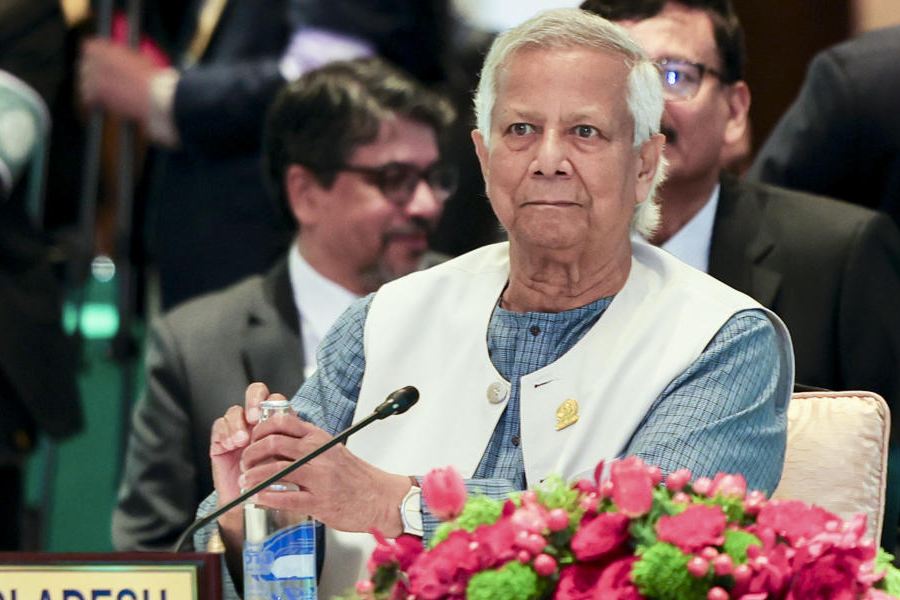.jpg)


Over 5,000 liquor shops across the state went dry on the first day of the partial prohibition on Friday. All the shops were either sealed by the administrative officials or wore a deserted look with no stocks available for the alcoholics.
The two shops at Tajpur Morba in Samastipur district, which witnessed a mad rush on the eve of prohibition on Thursday, remained closed on Friday. "The stocks lasted only a couple of hours. The shop was closed after 10pm on Thursday," Rajesh Kumar, a salesman, said.
Rajesh was sitting beside the shop on National Highway 28 on the directive of his employer. "I have no work at all. But I am on duty just to take care of the shop. I don't know what will happen," he told The Telegraph.
A similar scene was witnessed at Saraiya bazaar, around 100 km west of Tajpur, in Muzaffarpur district. Officials of the district administration sealed the three licensed shops on Thursday night. Muzaffarpur had a total of 267 licensed liquor shops.
At Lalganj in Vaishali district, all desi (country-made liquor) shops remained shut. One Bhuwan Thakur, a salesman, said that though no official visited the shop, the shop was closed a day before the ban order came into force to avoid punitive action. The government has made provisions for harsher punishment for violators, he said.
Officials of the district administration, excise department and the police were seen visiting the markets in rural areas to take stock of the situation. "The ban is effective in all the parts of the district," Muzaffarpur senior superintendent of police (SSP) Ranjit Mishra said.
Unlike urban areas, liquor ban has come into effect in rural Bihar as desi liquor shops in about 45,000 villages closed down. The government has banned country-made and spiced liquor, which had high consumption rates in rural areas. However, the Indian made foreign liquor would be available for sale at government run shops in urban areas.
The day one of partial prohibition, which entails complete ban on sale of country liquor in Bihar, brought smiles on the faces of fair sex. Majority of them were seen coming out of their homes on Friday to express support to the move.
At Dahingaon village of Gaya district, around 100 km south of Patna, women were seen destroying liquor brand banners and some of the overenthusiastic ones were seen scratching graffiti have been put on several village walls.
Total prohibition cry
So palpable was the support for government's move that some of them even demanded total prohibition. One of them, who identified herself as Rina, said: "Let there be total prohibition in the state."
Women at Basman village in East Champaran district, around 160 km northwest of Patna, were happy for a very interesting reason. "My husband is talking sense today, else he generally used to be in inebriated condition and never talked to me properly," said Jaleshwari Devi.
In Bhagalpur and Banka districts in Eastern Bihar, April 1 carried a festive mood for women. Many came out to join the processions taken out in praise of the state government's decision for partial prohibition.
Tribal dominated villages, however, were an exception and most residents there were angry, claiming liquor was part of their culture.
Subdued joy
In Darbhanga, the heart of Mithila region, women were more restrained in expressing happiness. But in one-to-one talk they shared their joy. "Sloshed husbands thrashing their wives used to be a common sight here. At least one would not witness such scenes now," said Anita Devi of Taralahi village in Darbhanga.
Similar voices were heard in Pakohi village of Muzaffarpur district where women ended up praising the decision. They said the move would help ameliorate their families' condition, as husbands won't be able to spend money on liquor.
In the hinterlands of Saran district, The Telegraph came across two women who observed a fast as a thanksgiving gesture, as their husbands would not be able to drink now. "It (prohibition) has come as a big relief for us," said Usha Kumari and Shiva Kumari, the two fasting women who happen to be residents of Dighwara in Saran district.

.jpg)









